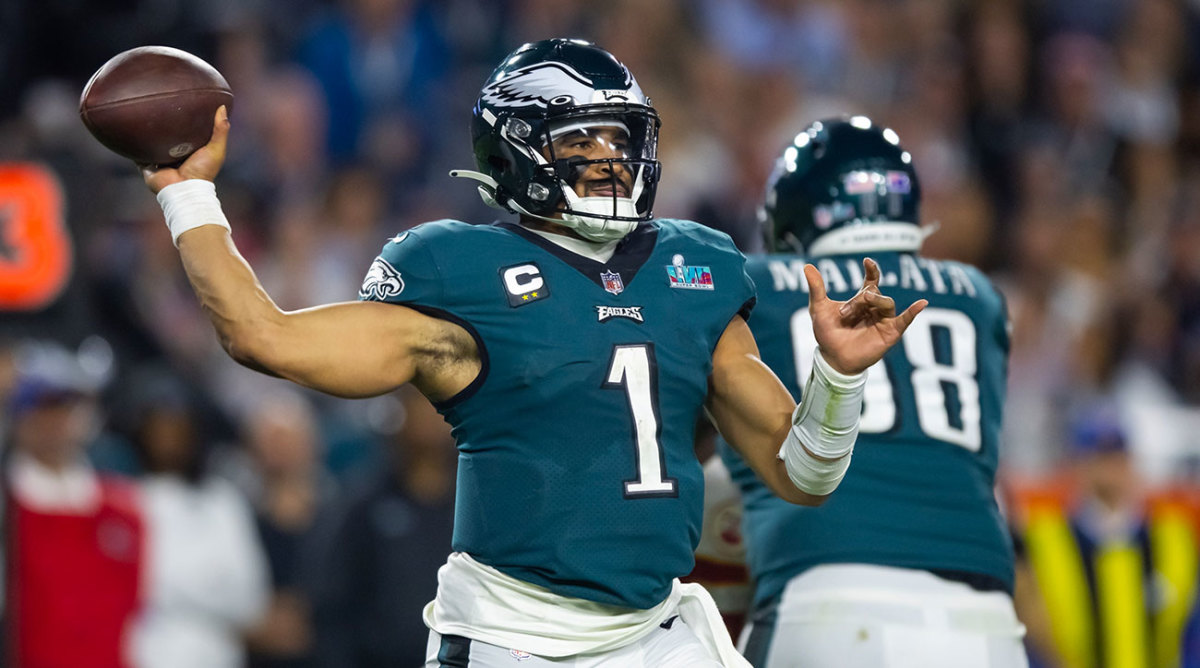The Eagles Were Smart to Give Jalen Hurts a Record Contract Extension Early
I don’t particularly care if you think Jalen Hurts is the Eagles’ quarterback of the future, a system product, an ascending star, a future mayor à la Ed Rendell or worth every penny of the five-year, $255 million extension he signed Monday. Those are all opinions based on conditional factors that are currently out of Hurts’s control, and the control of the organization he is now tied to long term.
There is a world in which Hurts will lift three Lombardi Trophies in his lifetime. There is also a world in which he’ll be excised from the organization’s plans, just like Carson Wentz. We’ll see which one we are living in.
The indisputable take at this moment is the Eagles did a bit of good business. They didn’t have another option nearly as enticing at the position, so they signed their existing one before Joe Burrow and Justin Herbert signed their deals and cannonballed into the market like a space shuttle landing in the ocean.
What else could the Eagles have done?

A lot of attention will be paid to the fact that, yes, at this very moment, Hurts is the highest-paid player in NFL history. His average annual value of $51 million slightly eclipses that of the contract signed by Aaron Rodgers. His $110 million guaranteed at signing is the third most given to a quarterback, behind the laughable Deshaun Watson deal and the contract signed by Russell Wilson upon Wilson’s trade to the Broncos. And yes, he will be paid more handsomely than Patrick Mahomes, whose team-friendly deal has been passed by multiple times despite his place as the game’s best player. That is a lot of money earned by a player who, before this season, seemed to be elevated by the parts around him, and not the other way around. That is also a lot of money earned by a player who carried the ball 300 times over the past two seasons.
But, it will pale in comparison to what the market will see in the coming weeks and months, and getting ahead of that spending spree is another reason why the Eagles are the Eagles. In instances where they cannot outmuscle or outplay someone, they are at least going to outthink them.
As I’ve written before, Burrow and Herbert could legitimately ask for fully guaranteed contracts and sweat out their employers in the process. The Bengals need Burrow so badly that they sold the naming rights to a stadium previously named after the owner’s father just to stock some money away in the bank. Without Justin Herbert, the Chargers would be an irrelevant, low-level tenant in the country’s most expensive slice of football real estate. The average annual value at the position could be pushing $60 million per year by the time we hit training camp.
The expected market ascension touches on what should be the most elemental part of a general manager’s playbook: Sign the guy before he becomes difficult to sign. If you are unsure about the process, or it becomes too difficult, then it’s time to look for another option. If another option doesn’t exist, see the part about signing the guy before he becomes too difficult to sign. While we were not privy to the conversations that took place between Lamar Jackson and the Ravens before they arrived at their public impasse, one would imagine there was an opportunity to set the framework for a far more sensible solution. That deal, as if it were already not complex enough, just got more difficult today, too.
The Jaguars, who have one more season with Trevor Lawrence before he’s eligible for an extension, should be watching. Any team that plans on drafting a quarterback in the top five this year should be watching. Oftentimes, we see clubs wrapped up in the fact that they do not have an outlier, a quarterback whose gravitational force is so strong that a game plan bends around his own personal ups and downs. In that process, they lose sight of the value of having someone such as Hurts—who may eventually reach that status or could, for a long time, occupy the upper echelon of Tier 2. Unfortunately, those players don’t cost any less than the outliers when it comes to the momentary spikes in salary during a year when multiple talented players are up for contracts at the same time. (See: Daniel Jones’s contract.) But in that indecision, the brief window of existing value passes them by.
NFL teams should not be judged by how frequently they can provide security and stability, because, ultimately, those do not exist in a sport with so many mitigating factors to long-term success. Instead, they should be judged by their ability to capitalize on various opportunities when they arise, and to unstick themselves more quickly from a bad situation. Philadelphia accomplished all of that by signing Hurts, and can now enjoy its front row seat to a few months of feverish, Wild West–style dueling at the contract table.
The deal the Eagles just dried the ink on will represent something lower than the absolute floor of the others. It could have become a complex piece of legal work that dragged out and offended the player they need, wobbling the franchise as it tries to prime for another title run. But, as we said, good organizations rarely let it get to that point.
